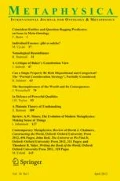Abstract
Jeff Wisdom has recently defended the proposition that any view of moral supervenience worth its salt must incorporate a diachronic view of base property exemplification. Let us call the proposition defended by Wisdom “p.” In this paper, I try to show that Wisdom has offered no good reasons for accepting p. My argumentative strategy proceeds along two separate tracks. First, I try to show that the thought experiment Wisdom employs in order to underwrite p does not offer the intended support for the proposition. Secondly, I try to show that even if the problems with the thought experiment in question are ignored, there is at least one other reason for thinking that Wisdom has not offered a convincing argument in favor of p.
Similar content being viewed by others
Notes
(S) is a relation of weak supervenience. To my mind, Zangwill (1995:259) and Shoemaker (1987:441) have argued convincingly that weak supervenience is a much less plausible supervenience relation in moral discourse than strong supervenience. p is controversial in the sense that in, the by now very exhaustive, literature on moral supervenience, the case for p has not hitherto been laid out in detail and defended. A critical discussion of p is therefore of some broad theoretical interest.
A small complication with the setup should be noted here. Since (S) is a thesis of weak supervenience, the thesis only tells us that anyone in Jones’ world who is identical to Jones in terms of brain state at T is also identical to him in terms of moral quality. (S) does not imply anything about the moral quality of people in other worlds who at T are identical to Jones in terms of brain state. In light of this, it is perhaps problematical to invoke a line of thought against Wisdom which involves individuals in distinct possible worlds and considerations about what their respective brain state and moral status is at T. This problem can, however, be overcome by thinking of Jones and Jones(w) as inhabiting one world that contains two distinct islands that are qualitatively identical in many of the ways in which the actual world and w are supposed to be qualitatively identical.
One might object to the suggestion that it is nomologically impossible for the two brains that are distinct in terms of physical properties in the interval between T-1 and T to become physically identical again at T. Does the argument against Wisdom collapse if this objection is accepted? The answer is “no.” Given that Wisdom’s line of thought rests on the assumption that it is reasonable to suppose that B at T is identical in the two scenarios, enough has been done to refute this line of thought if it can be established that this supposition is unreasonable. There is, moreover, no justification for believing that it is reasonable to suppose that Jones(w)’s brain state at T is identical to that of Jones’ at T.
It is worth noting that the thesis of the multiple realizability of mental states allows for the idea that Jones’ intention to shoot Smith is realized at T in a physically different way from the way in which Jones(w)’s intention to shoot Smith(w) is physically realized at T. So, from the mere fact that Jones(w) is physically different from Jones at T, it does not follow that they cannot be in the same mental state at T. However, the multiple realizability thesis can easily be accepted by theorists who believe that identity in terms of synchronic base property exemplification implies identity in terms of moral status. At one place in his paper, Wisdom writes as if what it is for a set of (physical) properties to be the subvening properties of a mental state is the same as what it is for such a set to be the realizer properties of a mental state (“which subvenes or realizes the mental state, “intending to shoot Smith”” (Wisdom 2008:431). What it is for a set of properties to subvene another property is, however, something different from what it is for such a set to realize another property.
This is not to suggest that (GlobalS) (or other global supervenience theses) is without problems. A classical reason for thinking that a global supervenience thesis such as (GlobalS) is implausible for moral discourse stems from the fact that it allows that worlds that are descriptively distinct in some very minor detail are ethically radically distinct (Kim 1987). The worry here is that global supervenience is too weak to capture an important desideratum of any supervenience thesis: namely that the supervening properties are dependent on the subvening ones. Another objection is that global supervenience does not imply weak supervenience (McLaughlin 1995). That is, global supervenience does not rule out that there are worlds in which descriptive duplicates differ in terms of supervening (moral) quality. The important point in relation to the present discussion is, however, that whatever problems (GlobalS) may have, its feature of not incorporating a diachronic view of base property exemplification is not one of them.
References
Jackson, F. 2000. From Metaphysics to Ethics: A Defence of Conceptual Analysis: Oxford University Press, USA.
Kim, J. 1987. ‘Strong’ and ‘Global’ Supervenience Revisited. Philosophy and Phenomenological Research 48 (2):315–326.
McLaughlin, B. 1995. Varieties of supervenience. In Supervenience: New Essays, edited by E. Savellos. Cambridge: Cambridge University Press.
Shoemaker, S. 1987. Review of Spreading the Word. Nous 21 (3):438–442.
Wisdom, J. 2008. Base property exemplification and mixed worlds: remarks on the Shafer-Landau/Mabrito exchange. Philosophical Studies 138 (3):429–434.
Zangwill, N. 1995. Moral Supervenience. Midwest Studies in Philosophy 20 (1):240–262.
Author information
Authors and Affiliations
Corresponding author
About this article
Cite this article
Sonderholm, J. Exaggerating the Importance of Diachronic Base Property Exemplification in Moral Supervenience. Int Ontology Metaphysics 12, 45–50 (2011). https://doi.org/10.1007/s12133-011-0076-4
Published:
Issue Date:
DOI: https://doi.org/10.1007/s12133-011-0076-4



